How Steve Jobs saved Apple with the online Apple Store
Alongside the return of Steve Jobs and the advent of the iMac and iPod, Apple's first online store played a crucial role in the company's survival and resurgence. It officially opened for business on November 10, 1997 and has been online ever since -- except when Apple takes it offline to promote the launch of new products.
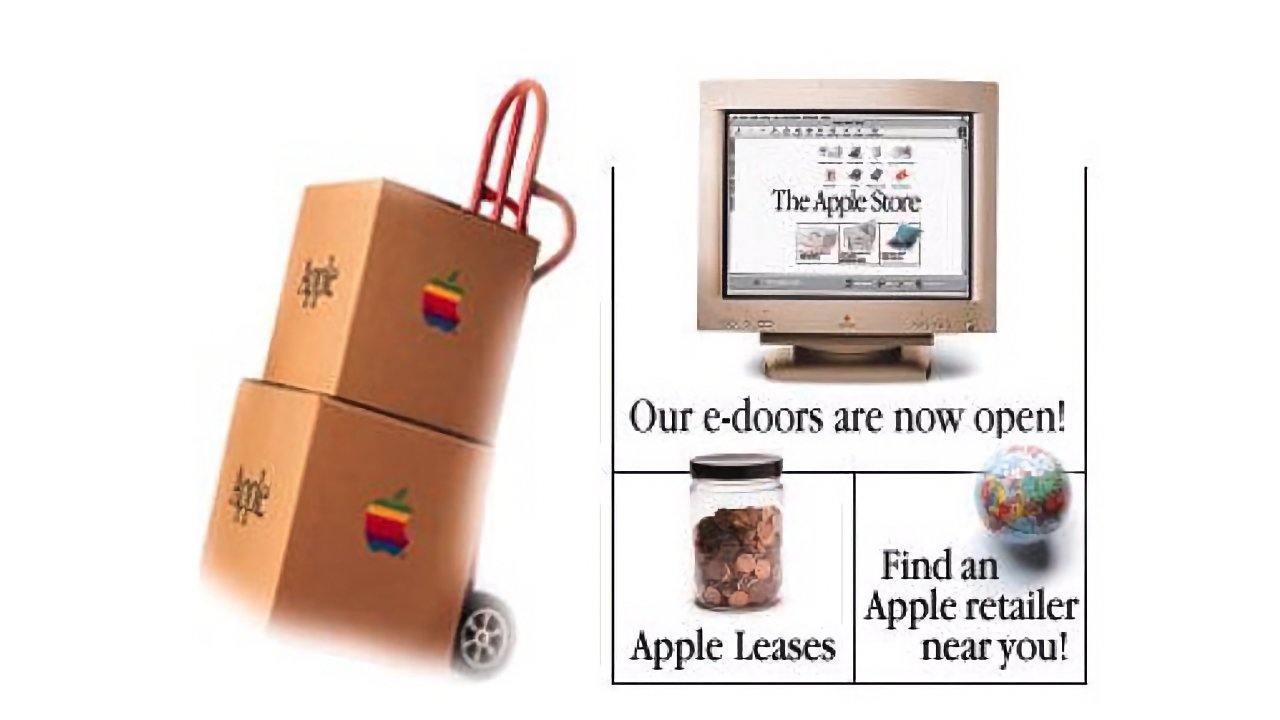
Detail from an early appearance of the Apple Store online
It wasn't enough that Steve Jobs came back to Apple and stripped its messy range down to a few core products. The iMac wasn't enough to turn the company around either -- not by itself. While it may not have seemed it at the time, the launch of the online Apple Store on November 10, 1997 turned out to be crucial component of the company's survival.
There's an argument that it was born of irritation rather than anyone seeing how useful it would be. But while there is truth in that, the full story is that Apple badly needed its own online store.
Back in the 1990s, there were no bricks-and-mortar Apple Stores. You had to buy Macs through specialist dealers or through big chain stores. The chains famously employed whatever the opposite of Geniuses is, and they all pushed whichever box they got the most commission on.
Given that Apple was rarely, if ever, the most profitable sale for someone in a store, what Macs were there tended to be ignored. And you don't run a retail store by taking up space with inventory that isn't selling, so Apple was being stocked by fewer places.
Shortly before the launch of its own online store, Apple announced a deal with CompUSA to create what it called a store-within-a-store. It meant a higher profile for Apple than before, but it was still under someone else's control.
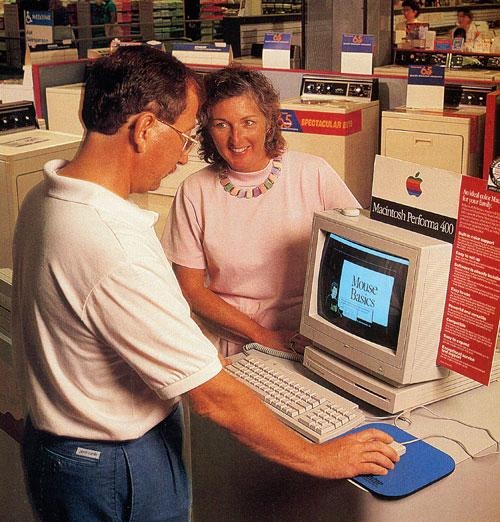
A Sears store selling a Macintosh Performa back in the day. Those are washing machines behind them.
"All that the salesman cared about was a $50 spiff," Steve Jobs later told Walter Isaacson. "Unless we could find ways to get our message to customers at the store, we were screwed."
Whereas apple.com/store was owned and run by no one but Apple itself.
There were few online stores for computers in the late 1990s, but what there was proved to drive Apple down this road though a combination of irritation and insight.
Dell
There was really only one significant online store for computers at the time, and that was Dell's. The company didn't design computers in the sense that Apple did, it really just packaged them, but at the time, it packaged them extremely successfully.
Dell had also circumvented the need for resellers and chain stores, by chiefly selling over the phone. Not only did it cut out the need and the cost of these other companies, it meant Dell could ask customers what they wanted and then give it to them.
Just as Apple was starting to do, Dell had got its stock of completed computers down to a minimum. "If I've got 11 days of inventory and my competitor has 80," said Michael Dell at the time, "and Intel comes out with a new 450 megahertz chip, that means I'm going to get to market 69 days sooner."
While few or no other sellers were doing much online, in 1995 Dell began to create its web store. It launched in July 1996 and by that December was earning $1 million per day.
Apple had to be aware of this success and had to see that it was a way that it too could go around resellers and get Macs in front of people. However, this was also Dell. This was the company whose owner Michael Dell famously wrote off Apple's chances. "I'd shut [Apple] down and give the money back to the shareholders," he said in October 1997.
And it is also the company who originally built this extremely successful online store using WebObjects -- software tools created by Steve Jobs's NeXT firm.
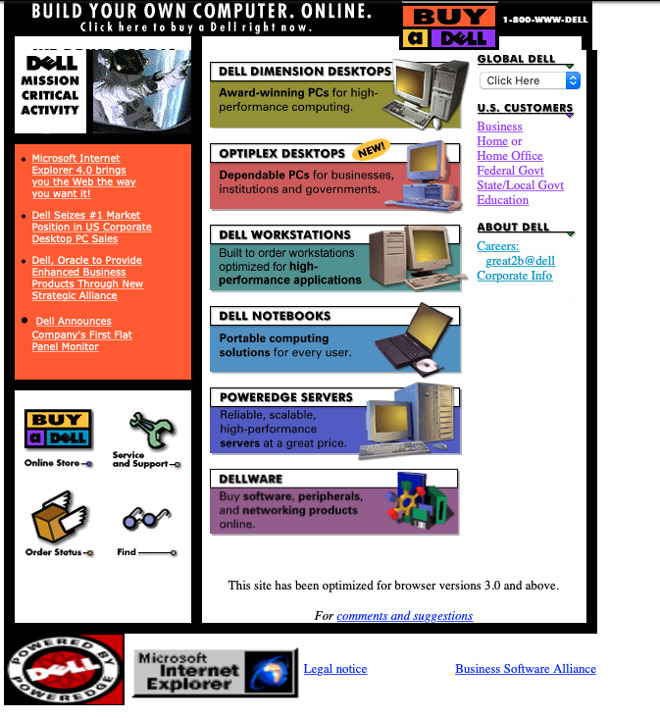
How Dell's hugely successful online store looked around the time Apple launched its own
So Apple, having bought NeXT and brought back Steve Jobs, had the talent to make a store but it also had the need if it were to make its machines as easy to buy as they were intended to use. Michael Dell's comment came after Apple had started to develop its online store, but it definitely smarted -- as you can see in video of Steve Jobs launching the Apple online store.
You can see it, but you can't really hear it. Video survives of the presentation, but it is close to inaudible.
What Jobs says in it, though, is directed both at potential buyers -- and at Michael Dell.
"In 1996, Dell pioneered the online store and Dell's online store has become, up till now, the standard of ecommerce sites," said Jobs. "We're basically setting a new standard for online ecommerce with this store. [And] I guess what we want to tell you, Michael, is that with our new products and our new store and our new build-to-order manufacturing, we're coming after you, buddy."
Instant success
The new online Apple Store brought in $12 million of revenue in its first 30 days, for an average of $730,000 per day. That's three-quarters of where Dell's daily revenue had reached after its first six months.
It's not possible to compare Apple's online sales then with how the online store does today. Apple doesn't release figures that would help, and the company itself is radically different today. Back in 1997, there were no services, for instance, it was all hardware sales. And while there were physical stores you could Macs in -- in October 1998, Apple announced a deal with Best Buy -- there were no Apple Stores.
However, there surely wouldn't be physical Apple Stores today if the online one hadn't succeeded and if it hadn't helped Apple survive. Similarly, resellers were declining, so even if Apple had managed to get through the 1990s, it's likely that there would be few physical places to buy Apple gear.
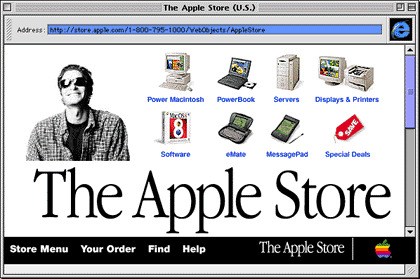
Back in the day, this was considered high resolution. A typical opening screen from the online Apple Store in its earliest days.
Even if it can only give a taste of how Apple has changed, though, it is possible to pick out certain figures from the company's finances and gain at least a slight basis for comparison.
Taking Apple's Q4 2019 earnings -- the last before all of its newest services had launched and been running for at least an entire quarter -- you can deduce that Apple sold $570 million worth of hardware devices every day in that period.
This means that every day, Apple typically earned 781 times what it got from the Apple Store's initial daily revenue. And if it's impossible to calculate what percentage of that came from the physical stores and what from online, it's now also impossible to imagine how crucial online sales became as stores closed during the coronavirus.
Changing fortunes
The online Apple Store was key to getting Apple back up on its feet, but it's also proved to be instrumental since the company became a born-again success.
It's now a promotional tool as well, as Apple makes a big deal of taking down the entire store for hours when it is about to announce a new product.
While any other company would long for the world to notice when its online store is down, Apple has also used it to pull off something that surely no other company would dream of.
We no longer see the huge lines around the block as people queue up and camp out to be first to buy a new device. You can question why anyone would ever do that -- though trust us, it is remarkably fun -- but the optics were fantastic. News coverage never seemed to tire of showing us these lines of people, and that was free advertising that kept reminding the world that Apple was this popular.
And yet during Angela Ahrendts' time as head of retail, Apple worked to at least reduce those lines.
Maybe the company saw that the furore was dying down by itself, but Apple took steps to instead have us waiting in front of our computers or iOS devices for the launches.
It's done that by opening pre-orders ahead of the release date, and opening them at a specific time.
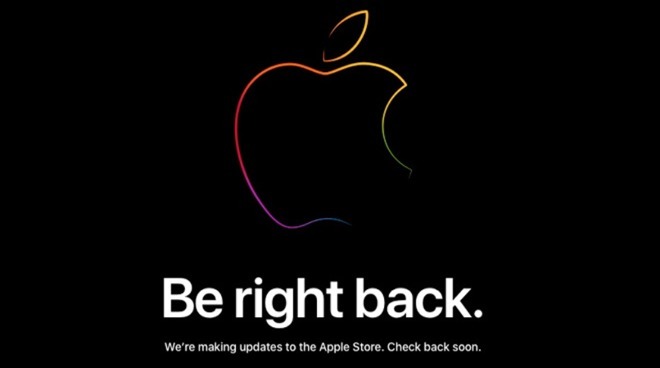
Nobody else gets worldwide headlines for taking their web store offline.
Now instead of the lines around the block, the news is always that devices have sold out in a very short time.
Apple's online store is an incredible operation that usually manages to look simple. It's hard to grasp just how many transactions go through it. But what's easy to comprehend is that Apple owns and runs the whole process without any retailer or big chain reseller in the middle.
As it does with its hardware and software, Apple owns the whole stack in its online store and it absolutely maximises every benefit that brings.
Keep up with AppleInsider by downloading the AppleInsider app for iOS, and follow us on YouTube, Twitter @appleinsider and Facebook for live, late-breaking coverage. You can also check out our official Instagram account for exclusive photos.
Read on AppleInsider


Comments
behind their logistics operations. Steve poached him from Compaq, and the rest we know.
Macintosh clone company, Power Computing sold their poorly made but inexpensive Mac clones solely online via their very advance (for it's day) web site that allowed the customer to custom build their Macs with just a few mouse clicks. This was in 1993, before Steve Jobs returned to Apple. The Power Computing website was very effective and successful.
When Jobs returned to Apple, he immediately cancelled all Mac clone licenses and bought the Power Computing store website.
In very short time, the site was adapted to Apple's Mac line up.
Original credit for the Apple Store website goes to Mac clone company, Power Computing.
Buying computers at pretty much any brick & mortar (B&M) store back in the day was pretty much akin to buying a used car and dealing with a huckster salesperson or the "Dude, you're getting a Dell" dude incarnate. I gave up on the B&M huckster salesperson model very early on and gravitated to mail order, as in Gateway 2000, Zeos, PC's Limited, and a variety of vendors who schlepped their wares in Computer Shopper magazine/catalog. When Dell (formerly PC's Connection) came along with online ordering with a lot of build-to-order flexibility I could never imagine going into a B&M computer store to buy a computer ever again, except under extreme duress. The Apple Store changed the whole dynamic of B&M stores and I've enjoyed that experience overall, even to the point of knowing some of the staff by names and learning a little bit about them as people and their personal lives.
Tim Cook definitely added immensely to Apple's success. It may appear as a slam-dunk amazing move to get Tim Cook into the Apple fold, but when he arrived and of course getting Steve Jobs back at the helm was not a guarantee of success at the time. Both men took on a big risk to their personal and financial futures to resurrect Apple to the point where it became relevant again and position itself to move into new businesses that would strap a rocket to Apple's climb to where it is today.